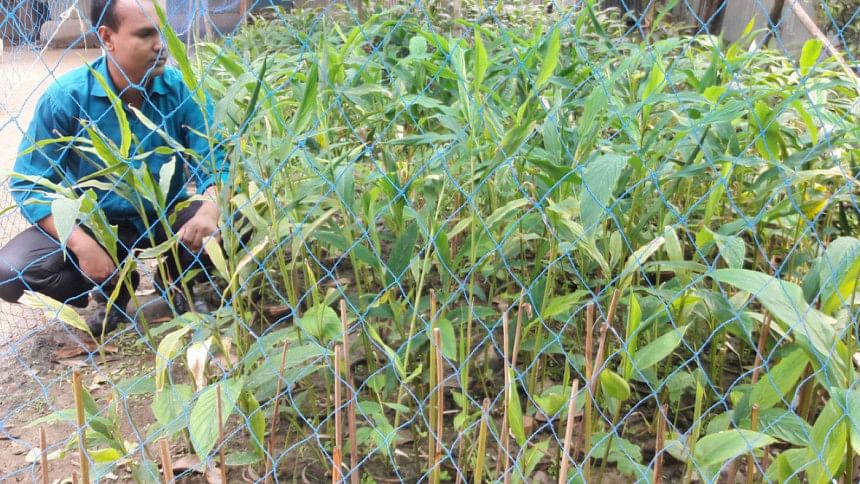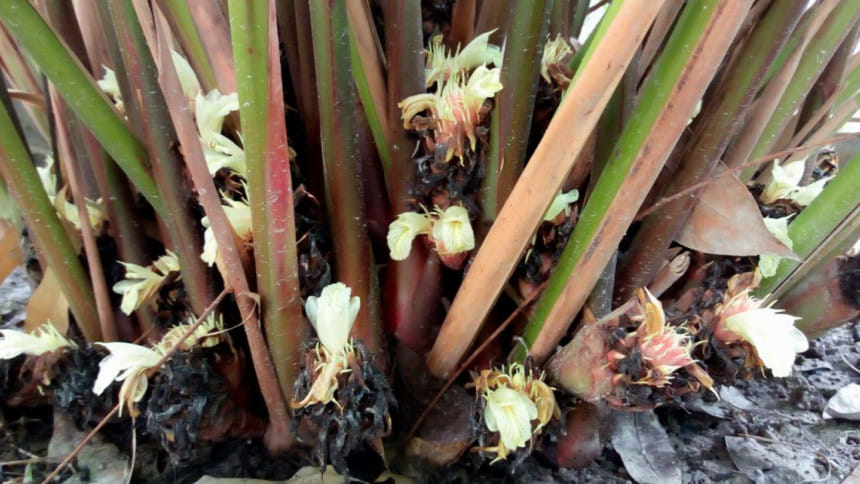Rezaul shines in Sri Lankan cardamom cultivation

The life of Rezaul Islam, a youth from Kurigram, was nothing out of the ordinary.
While poverty held him back from continuing his studies beyond his SSC in 1997, he held odd jobs here and there in Dhaka to make the days pass.
In 2006, a flustered Rezaul came back to his home in Natun Chiliarchar village under Rowmari upazila, where he began a nursery business to grow fruit plants on a small piece of leased land.
He visited Dhaka in 2008 to take part in the Bishwa Ijtema, an annual gathering of Muslims in Tongi.

“I used to watch a group Sri Lankans prepare their meals on small burners and the strong, pungent flavour and aroma of their spices, which they brought from their country, used to intrigue me,” recalls the 37-year-old.
He became friends with Abdur Rahman, 55, who said the distinct curry flavour came from the Sri Lankan cardamom.
“He told me that the cardamom is one of the world’s most expensive spices, next to saffron and vanilla, promising to bring back more the next year.”
True to his word, they kept contact over the phone and Abdur brought two spawning plants and some cardamom seeds in Bangladesh the next year.
Like an excited child, Rezaul planted those on unused lands behind his home. The plants soon grew tall but were near withering under amateur care.
With much trial and error and guidance from agriculture officials, he was able to expand the number of cardamom plants to one decimal of leased land.
The plants first bore cardamoms in 2011, said Rezaul. “I shared the herb with my neighbours and used it in our cooking as well. Everyone gave me feedback that the flavour was more aromatic than cardamoms otherwise available here.”
A cardamom plant can form a cluster of 20 plants in a year, he said. Each green cardamom, sweet and small variety, plant may yield around 20 grams of the dry herb a year, while the black cardamom, larger and smoky flavour, plants may produce around 30 grams.
In 2015, he contacted his relative Saiful Islam, a wholesaler of spices at the Kattimari Bazar of Rowmari upazila, some two kilometres from his house, and sold his first batch of Sri Lankan cardamoms.
“I sold one kilogram of the spice for Tk 3,000 a kilogram to Saiful. He would sell the spice to retailers for more at various markets in Tongi, Gazipur.”
With business picking up slowly but surely, he expanded cultivation to five decimals of land near this home and around 30 decimals of land at Himbazar area of Gazipur, said the farmer.
“I sold eight kilograms of green and black cardamoms in 2016, 15 kilograms in 2017 and 20 kilograms last year.”
“This year, I expect to sell the seeds worth over Tk 13 lakh. He sold cardamom seeds and plants worth Tk 5 lakh last year,” he added.
The plant, best suited to warm tropical climates, grows well in the shade and loamy soil, said Rezaul, who lives with his mother, wife and two children.
“Rowmari Upazila Agriculture Officer Abdulla Al Mamun visited my garden in 2017 and found the plants infected with fungus. He guided me on spraying anti-fungal medicine on the plants in case of disease. I use a mix of organic and inorganic fertilisers as well.”
In addition to selling the herb, he also sold some plants to fellow farmers in Comilla, Meherpur and Cox’s Bazar districts. “I sold each plant for Tk 1,000.”
D Mostafizar Rahman, deputy director of the Department of Agriculture Extension in Kurigram, said, “I was pleasantly surprised by visiting Rezaul’s garden recently. I advised him to spread his know-how to local farmers as well. I think the cultivation would improve when the spices research department would work with these cardamoms.”
Giving in to his adventurous spirit, he took a lease on two acres of land in Himbazar area of Gazipur in August, to expand operations.
“I prepared 30 decimals till March this year and sowed cardamom seed this month. I aim to grow around 1,000 plants at first,” he said.

 For all latest news, follow The Daily Star's Google News channel.
For all latest news, follow The Daily Star's Google News channel. 



Comments